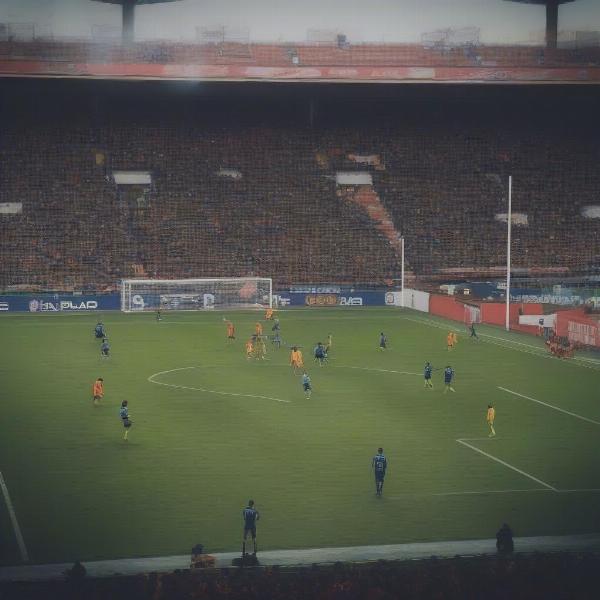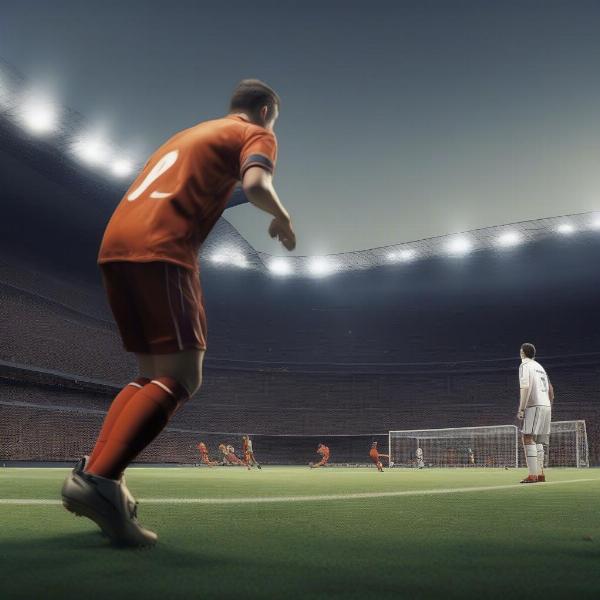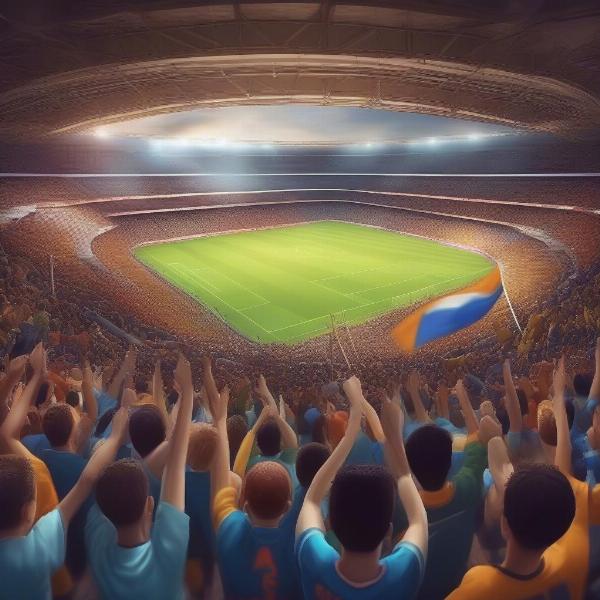A standard soccer (or football, as it’s known in most of the world) game is 90 minutes long, divided into two 45-minute halves. However, there’s more to the story than just those 90 minutes. This guide will explore the various factors influencing a soccer game’s total duration, from stoppage time to extra time and penalty shootouts.
Understanding the Basic 90 Minutes
The 90-minute regulation time is the core of any soccer match. Each half provides continuous gameplay, with players striving to score goals and outmaneuver their opponents. This timeframe is universally recognized and forms the foundation of the sport’s structure. The referee keeps track of the time and signals the end of each half with a whistle. This seemingly straightforward time frame is subject to interruptions and additions, making the actual duration of a soccer match often longer than 90 minutes.
Stoppage Time: The Added Minutes
One key aspect that extends a soccer game beyond the 90 minutes is stoppage time, also known as injury time or added time. This time is added at the end of each half to compensate for time lost due to various interruptions during play. These interruptions can include:
- Injuries: Treating injured players on the field.
- Substitutions: The process of swapping players in and out.
- Disciplinary actions: Issuing yellow or red cards, and dealing with any resulting disputes.
- Time-wasting tactics: Deliberate attempts by players to delay the game.
- Goal celebrations: While exciting, these also consume time.
- Any other unusual delays: This can encompass a range of situations, such as equipment malfunctions or external factors affecting the game.
The referee has the sole discretion to determine the amount of stoppage time added. This is often signaled by the fourth official holding up a board displaying the number of minutes. While stoppage time is typically a few minutes, significant incidents can lead to more extended periods.
 Stoppage Time Being Added in a Soccer Match
Stoppage Time Being Added in a Soccer Match
Extra Time: When the Score Remains Tied
In knockout competitions, such as tournaments or playoff games, if the score is tied after the 90 minutes of regulation and any added stoppage time, the game proceeds to extra time. Extra time consists of two 15-minute halves, adding a potential 30 minutes to the overall game duration.
During extra time, the same rules apply as in regulation time, including the addition of stoppage time at the end of each extra time half. If the score remains level after extra time, the game is decided by a penalty shootout.
Penalty Shootouts: The Ultimate Decider
Penalty shootouts are used as a tie-breaker when the score is still tied after extra time. Each team takes a predetermined number of penalty kicks, and the team that scores more wins the game. Penalty shootouts add another element of drama and excitement to the game but do not contribute significantly to the overall playing time.
 Penalty Shootout Tension in a Soccer Game
Penalty Shootout Tension in a Soccer Game
How Long is a Youth Soccer Game?
Youth soccer game lengths vary considerably based on age and league rules. Games for younger children are often shorter, ranging from 40 to 60 minutes, divided into halves or even shorter periods. As players get older, the game length gradually increases until reaching the standard 90 minutes for professional and high-level amateur matches.
Variations and Special Circumstances
While the standard rules dictate the general length of a soccer game, certain variations and special circumstances can influence the overall duration:
- Friendly Matches: In friendly matches, the rules regarding extra time and penalty shootouts can be modified or omitted by mutual agreement between the teams.
- Abandoned Matches: If a game is abandoned due to unforeseen circumstances like extreme weather or crowd disturbances, the remaining time might be played on a different date, affecting the overall time frame.
FAQs: Quick Answers to Common Questions
-
Q: How long is a half in soccer?
A: A standard soccer half is 45 minutes long. -
Q: What is stoppage time in soccer?
A: Stoppage time is added to each half to compensate for time lost due to interruptions. -
Q: How long is extra time in a soccer game?
A: Extra time consists of two 15-minute halves, totaling 30 minutes. -
Q: Are penalty shootouts included in the game time?
A: No, penalty shootouts are considered a separate tie-breaker and don’t count towards the official game time. -
Q: How long is a youth soccer game?
A: Youth soccer game lengths vary depending on the age group, typically ranging from 40 to 60 minutes for younger players. -
Q: Can a soccer game end in a tie?
A: Yes, in league matches, a game can end in a tie. However, in knockout competitions, ties are usually resolved through extra time and penalty shootouts. -
Q: Who decides how much stoppage time is added?
A: The referee has the sole authority to determine the amount of stoppage time.
Other Factors Influencing Game Duration: Broadening the Perspective
Beyond the regulated timeframe, other less obvious factors contribute to the overall experience of a soccer match and its perceived duration:
- Broadcasts and Commercial Breaks: Televised games often include pre-game analysis, half-time shows, and post-game discussions, extending the viewing time significantly. Commercial breaks during these broadcasts also add to the overall duration.
- Stadium Experience: Factors like entering and exiting the stadium, navigating crowds, and waiting in lines for concessions contribute to the overall time spent at a soccer match.
 Soccer Fans Creating Stadium Atmosphere
Soccer Fans Creating Stadium Atmosphere
Conclusion: More Than Just 90 Minutes
So, while a soccer game is nominally 90 minutes long, various factors like stoppage time, extra time, and penalty shootouts can extend the actual duration. Understanding these elements allows for a more complete appreciation of the sport and the dynamics influencing its timeframe. Whether you’re a seasoned fan or a newcomer to the beautiful game, recognizing the nuances of game length enhances your understanding and enjoyment of this global sport. Share this guide with your fellow soccer enthusiasts and join the conversation about the intricacies of the game!

